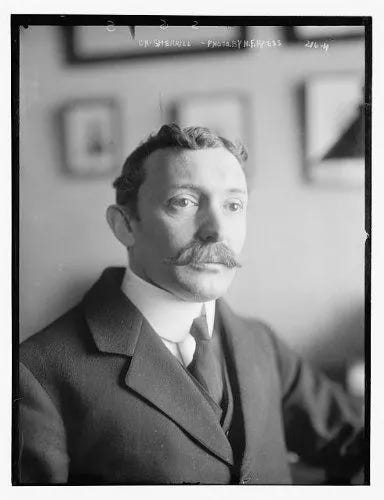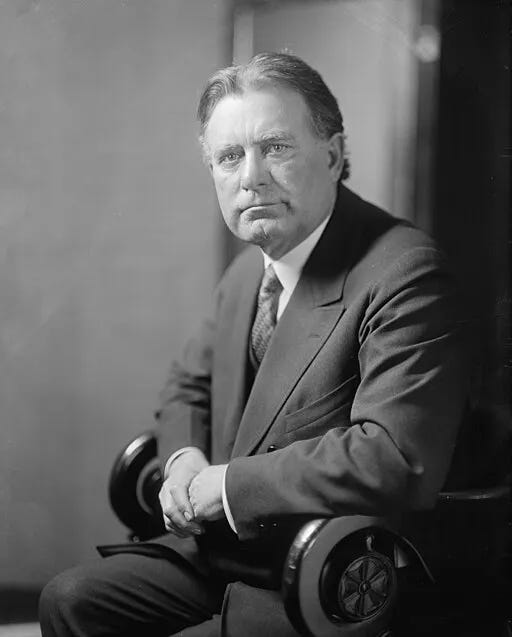Johann von Leers: Out of the Way! Part 3/3 [Der Weg 1951-10]
An original translation of "Aus dem Wege!"
Title: Out of the Way! [de: Aus dem Wege!]
Author(s): Johann Jakob von Leers as “Gordon Fitzstuart”
“Der Weg” Issue: Year 5, Issue 10 (October 1951)
Page(s): 729-732
Dan Rouse’s Note(s):
Der Weg - El Sendero is a German and Spanish language magazine published by Dürer-Verlag in Buenos-Aires, Argentina by Germans with connections to the defeated Third Reich.
Der Weg ran monthly issues from 1947 to 1957, with official sanction from Juan Perón’s Government until his overthrow in September 1955.
I want to express my deep gratitude to “wilhelm25” for his high quality scans and curation of the both the magazine Der Weg and further related works. To crib his notes from Forces Behind Roosevelt, published by von Leers in 1941, he draws a direct line to the current article published in 1951. Citing Dieter Vollmer, an Editor for Der Weg, in his 1993 autobiography:
"Prof. von Leers, under the pseudonym Gordon Fitzstuart, penned three continuations drawn from his own profound understanding of these connections. He had access to a wealth of sources otherwise scarcely available.”
Most newspapers, originally published in English, have not been verified against the source and so are back-translated. The Washington Times Herald was verified and reflects the original language.
Source Documents:
[LINK] Der Weg 1951 German Scans
[LINK] Forces Behind Roosevelt (1941) [de: Kräfte hinter Roosevelt]
[LINK] Dieter Vollmer: Taking Stock of the First Half of Life
Washington Times Herald, 1940-01-20, Page 10 - “The Great Isolationist”
[LINK] Biskop Thomas Frihetssång
Mr. Charles Hitchcock Sherrill was a highly educated American of the fine, old school—a man of deep learning, instinctively wary of empty slogans. He had served as ambassador to Turkey and held great admiration for Mustafa Kemal Atatürk. Europe, too, was no stranger to him. In 1931, he published a book titled Bismarck and Mussolini, followed in 1933 by another, Roosevelt and Mussolini. He was not without sympathy for the new intellectual dawn breaking over Europe under Mussolini’s leadership—yet the longer he watched Roosevelt’s actions, the more he turned against him. On June 25, 1936, he met his end in an automobile accident, the details of which remain shrouded in mystery.
Senator Ernest Lundeen, of Swedish descent, was a forthright and honorable champion of Minnesota’s farmers. As early as 1917, during the First World War, he had cast his vote in the House of Representatives against America’s entry into the conflict with Germany. This alone earned him the enmity of the Wilson faction. For the grandiose idealist Wilson—whose grasp of economic matters was feeble, almost childlike—relied wholly on Bernard M. Baruch for financial counsel and Justice Brandeis for constitutional guidance. Both were fervent Zionists, and one of the war’s paramount aims was the dismantling of the Ottoman Empire to forcibly establish a Jewish state in Palestine.
S. Landman, writing in the Jewish Chronicle on February 7, 1936, offered a striking revelation:
“In the critical days of 1916, with Russia’s collapse looming, Jewish sentiment was broadly anti-Russian. Hopes rested on a victorious Germany granting Palestine to the Jews. At that juncture, the Allies made repeated efforts to draw America to their side, but success eluded them. Mr. James Malcolm, then closely tied to both camps, took it upon himself to persuade the British and French governments that the surest—perhaps the only—way to spur the American president into war was to win over Zionist Jewry with the promise of Palestine. Thus, the Allies could harness and unleash the untapped might of Zionist Jews in America and beyond, secured by a fitting quid pro quo. President Wilson placed the utmost weight on Justice Brandeis’s counsel. The Zionists rose to the task, paving the way for America’s entry into the war.”
The London Jewish Chronicle of the same date echoed this pivotal Zionist role in America’s wartime decision, declaring:
“The only path to draw President Wilson into the world war was to enlist Zionist Jewry’s cooperation by pledging Palestine to them. The Zionists fulfilled this charge and helped bring America into the fray.”
The Zionists’ reward came in the form of the British government’s pledge, penned in Foreign Secretary Arthur Balfour’s letter to Lord Rothschild on November 2, 1917—known to history as the “Balfour Declaration”—which promised the Jews a homeland in Palestine.
It stands to reason that an American senator who sought to unravel this grand design—merely because he balked at the thought of Minnesota’s farm boys spilling their blood for Zionism’s loftiest ambitions (what did these simple, blond, gentile lads matter, when Israel, after nearly a millennium, reached once more for the “promised land of the fathers”?)—could reap only the bitterest hostility from political Zionism.
Nor did Senator Ernest Lundeen bend or relent. He bore the stubborn pride of his Swedish peasant forebears, who refused to bow—those who, under Gösta Erikson Wasa, once drove the tyrant Christian II from their land. Their creed was captured in the splendid medieval chronicle of Thomas of Strängnäs, words that might crown any rooted Germanic peasantry:
„Frihet är det bästa ting som sökas kan all världen kring, för den en väl kan bära. Vill du vara dig själver huld, du älske frihet mer än guld? Ty frihet följer ära.“
Freedom is the finest thing—sought across the seas and lands by those who wield it wisely. Do you seek to honor your true self, do you prize freedom over precious gold? For freedom follows glory.
In Minnesota, where vast stretches are settled by Swedes, the “gamla ärasven”—the “old friend of honor,” as his fair-haired kin called him—drew strength anew from their spirit. He felt as these farmers did, at peace. He harbored no hatred, no wish to persecute the Jews. Yet he would not see America’s youth driven onto foreign battlefields for aims alien to their nation. He knew the farmer’s true foe was not Adolf Hitler but nearer at hand—where mortgage banks and grain speculators swindled and stripped the farmer of his labor’s fruit. Roosevelt struck him as eerie, profoundly distasteful. With calm reason and grave resolve, the old farmer-senator voted against Roosevelt’s New Deal, his military proposals, and the ever-less-neutral stance amid the war. He did not rant—he warned with solemn weight. And he was heard. As a voice for rural America, as a foe of Roosevelt’s farm-wrecking agricultural policies (shaped by Mordecai T. Ezekiel), Senator Lundeen grew troublesome. In the end, he was far too troublesome.
Precisely because he spoke plainly and honorably for America’s rural folk, without stooping to demagogy, because he dared to stand for honest peace against the shadowy powers craving war, he stirred hatred.
On September 29, 1940, he perished in a commercial plane crash near Lovettsville, Virginia. The magazine Click, in its March 1941 issue, noted:
“He died in one of the most baffling aviation disasters in history.”
In some quiet file, another line could be struck through a card…
Senator William Edgar Borah was born on June 29, 1865, on a farm near Fairfield, Illinois, descended from the lineage of Katharina von Bora, Martin Luther’s wife—thus, across many generations, of German stock. He studied law, became an attorney, and settled in Boise, Idaho, soon earning renown as a steadfast defender of farmers against speculators and usurious banks. In 1907, the farmers sent him to the Senate. For 33 years, this towering figure with a thunderous voice held Idaho’s Senate seat, a state wholly rural. Within the Republican Party, his influence loomed large. For years, he chaired the Senate Foreign Relations Committee. With fierce resolve, he blocked the United States from signing the Versailles Treaty, sparing his nation a shameful stain. He also kept America out of the League of Nations.
Wilson dreaded the “Lion of Idaho,” who battled his utopian schemes with unyielding vigor. When Franklin Delano Roosevelt rose to power, Senator William E. Borah was among the first to see plainly that an unconstitutional dictatorship was taking root. With a voice that boomed, flattening his foes, pounding his mighty fists on the podium when needed, he guarded the Senate’s rights against the president’s power grab, and the citizen’s rights against the surrender of the American people to an utterly un-American bureaucracy. The “Grand Old Man,” with his snow-white mane, raged against any U.S. meddling in European affairs. Like Senator Lundeen, he stood for the farming folk who wished to steer clear of Europe’s quarrels. In the same year as Lundeen, on January 19, 1940, he was abruptly summoned to the eternal hunting grounds, under circumstances never fully clarified.
London’s shortwave radio sneered after the fallen lion, claiming
“Borah’s sole political office was to serve as senator for half a million sheep ranchers and cowboys in Idaho.”
Paris’s L’Ordre, a thoroughly Jewish publication, wrote:
“His death harms our position in the United States not at all—quite the contrary.”
One can well believe it.
Yet in America, the Washington Times Herald published a near-prophetic eulogy for the “Lion of Idaho,” so suddenly swept from Roosevelt’s warpath:
“[Borah] opposed the foreign policies of Mr. Roosevelt, and beat the policies of Roosevelt’s former chief, Wilson. […]
It would be interesting to speculate what might have happened if we hadn’t jumped into the last war. It seems to us now that not only we but also Europe would have been better off. […]
If the Allies had known we weren’t coming to their assistance, they would have been forced to make a compromising peace in early 1917. But after we went in, they fought on. […]
Maybe the Germans would have gained a little territory out of a peace without victory, but probably they would have traded out of it to get their colonies back. […]
Then came our assistance, and the Allies won, and they were as rapacious in victory as the Germans would have been. Britain grabbed Germany’s colonies and her navy. France grabbed Alsace-Lorraine - not only the French sections of Alsace-Lorraine, but also the predominately German sections. An indemnity which Germany couldn’t possibly pay was imposed on her. This indemnity, and the French Occupation caused great misery. It ruined Central Europe. It caused the present war.
Voices are being raised against isolation for America. These voices are getting louder. […] These, or the like, voices led us into the last war.
If we do go over to help the Allies, we may expect to see the last 20 years repeated.
There will be a peace as exacting, as unrelenting, as the Treaty of Versailles.
There will be chaos again in the subjugated sections of Europe, and probably inflation, and certainly terrible suffering.
And in due course, there probably will be another war, and the same voices urging us into it.”
But this voice at the grave of Idaho’s “Grand Old Man” went unheeded. Stronger were the forces bent on wielding the United States as a pawn for their ends.
If today great swaths of our people, with mounting bitterness, see in the “Ami” only the lackeys of the Morgenthau, Frankfurter, and Roosevelt clique—if, unlike after the First World War, forced democratization, torture camps, denazification, patent theft, and the Landsberg gallows leave our people viewing Americans at best as a lesser evil beside the Soviets—let us not forget there was another North America. One that was “cleared from the path” to make way for their own ghastly aims. This other North America lies nearly as voiceless as we do today, watching in despair as Morgenthau stains its nation’s name before the world.








